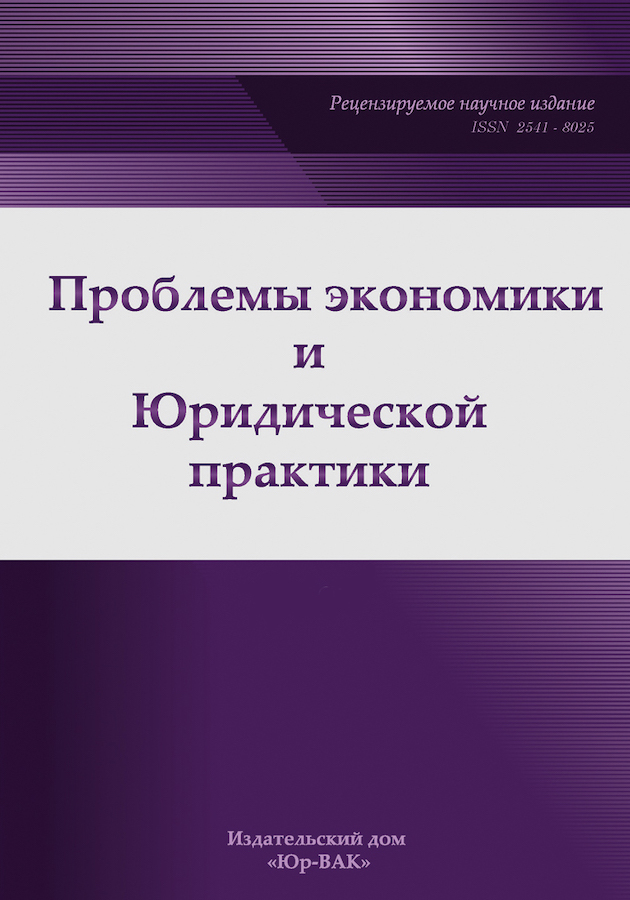Analysis of judicial practice in cases involving violations of the requirements for the protection of trade secrets carried out by employees of organizations
- Authors: Zharova A.K.1
-
Affiliations:
- Financial University under the Government of the Russian Federation
- Issue: Vol 19, No 5 (2023)
- Pages: 39-44
- Section: Public Law (State and Legal Sciences)
- URL: https://journals.eco-vector.com/2541-8025/article/view/626923
- EDN: https://elibrary.ru/UPEYMK
- ID: 626923
Cite item
Abstract
The purpose of the research is to analyze the positions of civil, arbitration and criminal courts in cases involving violations of the requirements for the protection of commercial secrets committed by persons admitted to this information in the performance of official duties. Restricted access information is particularly valuable for the organization, but its protection should be ensured by taking measures, which include legal, organizational and technical measures. The legislation obliges the holder of restricted access information to take such measures.
Result. Actions of employees admitted to restricted access information that formally do not violate the requirements of local regulations of the organization, but go beyond the limits established by law can be qualified by courts as offenses. Criminal courts prioritize the requirements of a special law regulating relations related to a certain category of restricted access information, which simultaneously with access restrictions may not relate to commercial secrets.
Full Text
About the authors
Anna K. Zharova
Financial University under the Government of the Russian Federation
Author for correspondence.
Email: anna_jarova@mail.ru
SPIN-code: 2240-1467
Dr. Sci. (Law), Associate Professor, Leading Researcher and professor of the Department of Information Security
Russian Federation, MoscowReferences
- Chen, C. Restricted Mean Value Theorems and the Metric Theory of Restricted Weyl Sums / C. Chen, I. E. Shparlinski // Quarterly Journal of Mathematics. —2021. —Vol. 72, No. 3. —P. 885–919. —doi: 10.1093/qmath/haaa052.—EDN COQDUS.
- Chugunova, N. I. On the problem of ensuring APCS information security / N. I. Chugunova, O. V. Maslova, A. I. Kuklina // Современные тенденции развития науки и технологий. —2015. —No. 2-2. —P. 171–173. —EDN TYRTNR.
- Samaha, . F , Seshadri P, Iqbal N., Stern L. Effects of carbohydrate-restricted diet versus a fat-and calorie-restricted diet on lipid subfractions / F. F. Samaha, P. Seshadri, N. Iqbal, L. Stern // Journal of the American College of Cardiology. —2003. —Vol. 41, No. 6 S1. —P. 243. —doi: 10.1016/S0735-1097(03)81716-3. —EDN ETDECF.
- Vilinov, I. E. A comprehensive solution for ensuring information security of an industrial facility infrastructure / I. E. Vilinov, A. V. Volodin, V. V. Dergachev // Telecommunications and Radio Engineering. —2013. —Vol. 72, No. 3. —P. 181–193. —doi: 10.1615/TelecomRadEng.v72.i3.10. —EDN RFCMSF.
- Yuan, Ji. X. Restricted Cohomology of Restricted Lie Superalgebras / Ji. X. Yuan, L. Yu. Chen, Ya. Cao // Acta Mathematica Sinica. —2022. —Vol. 38, No. 11. —P. 2115–2130. —doi: 10.1007/s10114-022-1088-4. —EDN WRYQJJ.
- Zharova, A. Ensuring the information security of information communication technology users in Russia / A. Zharova // International Journal of Cyber Criminology. —2019. —Vol. 13, No. 2. —P. 255–269. —doi: 10.5281/zenodo.3698141. —EDN LTMESV.
- Zhou, R. Relationship between the restricted AKNS flows and the restricted KdV flows / R. Zhou // Chinese Annals of Mathematics. Series B. —2012. —Vol. 33, No. 2. —P. 191–206. —doi: 10.1007/s11401-012-0703-6. —EDN PLNWHB.
- Beketova N.A. How to properly and reliably protect confidential information? HR practitioner. 2022. No. 2. pp. 133–176.
- Ganzha, M. V. Problems of criminalization of access to restricted computer information at the present stage / M. V. Ganzha // Jurist-Pravoved. —2023. —№ 2(105). —Pp. 88–93. —EDN FBNQKY.
- Gibadullina Z. How programmers are legally caught stealing trade secrets for competitors. Labor Law. 2021. No. 3. pp. 43–50.
- Goncharova V.A. Disclosure of confidential information at the stage of negotiations (Article 434.1 of the Civil Code of the Russian Federation): problems of consistency of legal regulation. Economy and law. 2022. No. 11. pp. 83–91.
- Zharova A.K. Ensuring the protection of the state from computer attacks in the ICT sphere. Proceedings of the Institute of State and Law of the Russian Academy of Sciences. —2022. —Vol. 17, No. 4. —pp. 100–125. —doi: 10.35427/2073-4522-2022-17-4-zharova.
- Kovalenko, A. O. Legal regimes of restricted access information in legal proceedings / A. O. Kovalenko // Russian Justice. —2020. —No. 12. —PP. 37–55. —doi: 10.37399/issn2072-909X.2020.12.37-55. —EDN UGXKTY.
- Martasov D. Commercial secret of the company: issues of judicial practice. Labor law. 2021. No. 3. pp. 101–108.
- Poleshchuk, D. G. The legal regime and types of information of limited dissemination in legislation / D. G. Poleshchuk // Justice of Belarus. —2021. —№ 8(233). —Pp. 5–9. —EDN HJABYT.
- Leaks of restricted access information: judicial practice // Information protection. Inside. —2020. —№ 2(92). —Pp. 80–85. —EDN SLXHKL.
Supplementary files









